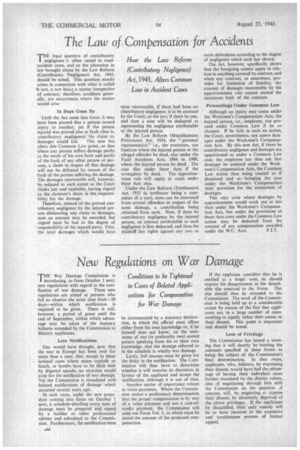New Regulations on War Damage
Page 46

If you've noticed an error in this article please click here to report it so we can fix it.
Conditions to be Tightened in Cases of Belated Applications for Compensation for War Damage
THE War Damage Commission is I introducing, as from October 1 next, new regulations with regard to the notification of war damage. These new regulations are aimed at persons who fail to observe the strict time limit-30 days—within which notification is required to be given. There is still, however, a period of grace until the end of September, within which advantage may be taken of the leniency hitherto extended by the Commission to dilatory applicants.
Late Notifications
One would have thought, now that the war in Europe has been over for more than a year, that, except in those isolated cases where mines explode or beach, or bombs have to be dealt with by disposal squads, no occasion would arise for the notification of war damage. Yet the Commission is inundated with belated notifications of damage which occurred several years ago.
In such cases, under the new procedure coming into force on October 1 next, a schedule-detailing every item of damage must be prepared and signed by a builder or other professional adviser and submitted to the Commission. Furthermore, the notification must
be accompanied by a statutory declaration, in which the official must affirm either from his own knowledge or, if he himself does not know, on the testimony of one (or preferably two) named person speaking from his or their own knowledge, that the damage referred to in the schedule is wholly war damage.
Lastly, full reasons must be given for the delay in the notification. The Commission will then have to determine whether it will exercise its discretion in favour of the applicant and accept the notification, although it is out of time.
Another matter of importance relates to value payments. Where the Commission makes a preliminary determination that the proper compensation is by way of a value payment and not a cost-ofworks payment, the Commission will send out Form Vol. 5, in which must be stated the amount of the proposed compensation.
If the applicant considers that he is entitled to a larger sum, he should express his disagreement in the detach able slip annexed to the Form. This slip should then bc returned to thc Commission. The work of the Commission is being held up to a considerable extent by reason of the fact that applicants are, in a large number of cases omitting to signify either their assent or their dissent. This point is important and should be noted.
Loss of Privilege The Commission has issued a warning that it will shortly be treating the amounts specified in these forms as being the subject of the Commission's final determination. In that event, applicants, who, hitherto, by expressing their dissent, would have had the advantage of having their individual cases further examined by the district valuer, also of negotiating through him with the Commission on the question 4 amount, will, by, neglecting to express their dissent, be absolutely deprived of the above privileges. If the applicants be dissatisfied, their only remedy will be to have recourse tO the expensive and troublesome process of formal appeal.




































































